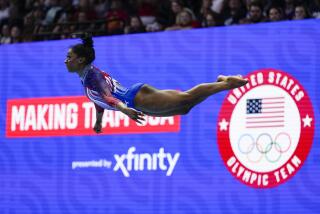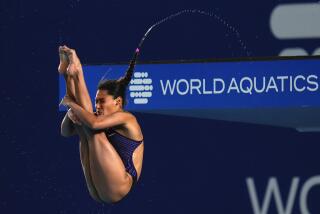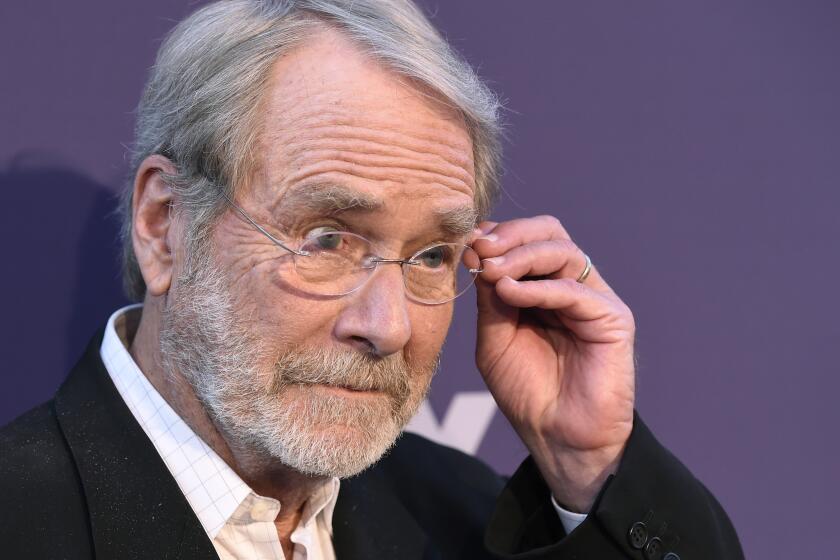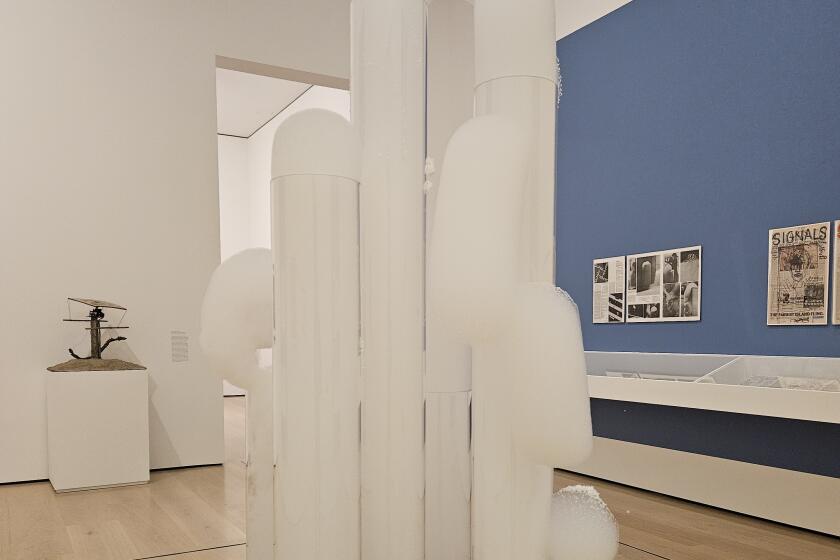The Best Music Doesn’t Get ‘Official’ Nod
Two years ago, the Atlanta Committee for the 1996 Olympic Games’ Cultural Olympiad picked a winner. In celebration of the 50th Anniversary Season of the Atlanta Symphony, it commissioned a short, Olympics-spirited piece from one of the hottest and best young American composers, Michael Torke.
“Javelin,” when played as it is supposed to be played and as it is by the Atlanta Symphony on a new Argo CD, lasts exactly 8 1/2 minutes. It’s got memorable tunes and spunky post-minimalist animation; it’s up to date yet perfectly designed to capture the essence of the Games. It has the ability to lift the spirit time and time again. And, in a classic all-American touch, Torke named his piece not just after the ancient Olympian symbol and sport but also after his dad’s old car.
But “Javelin” was not selected as the official Olympics theme music. The Atlanta Committee for the 1996 Olympic Games and its media partner, NBC, has come up with another piece that, starting Friday, you will hear and hear and hear and hear and hear. And then hear some more.
“Summon the Heroes,” written for the Centennial Celebration of the Modern Olympic Games, Atlanta, Georgia, July 19, 1996--more official wording from whatever over-titled Olympics committee is entrusted with such directives--has received that honor. It will be played Friday night by the Atlanta Symphony to welcome the Olympians at the opening ceremonies. It will be the NBC theme. Bits of it will accompany the medal ceremonies.
It was composed by John Williams, and it is junk.
“Summon the Heroes” is no more than an exercise in chest-thumping and whooping, including the sort of fanfares that one has come to expect at these events, given that Williams has done similar duties for Olympics past. The title track for a new Sony CD (the “Official Licensed Classical Record of the Atlanta Committee for the Olympics Games Inc.”), it has Williams’ recognizable style. It announces that something big is about to happen, the way Williams’ music for “Star Wars” does, the way his theme for the “NBC Nightly News” does.
What Olympics music is really supposed to do, of course, is project an irrepressible mood of pomp and circumstance. But noble pomp is easily corrupted into its ignoble cousin, pomposity, and that is where Williams, NBC and all those long-winded Olympic titles come in.
A perfect demonstration of exactly how that can happen is found in Williams’ approach to music, and not just his own music. In the Sony collection, which features music heard at other Olympics along with a few movie themes to help keep things in perspective, Williams conducts his own performance of “Javelin” with the Boston Pops Orchestra.
On the Argo release, “Javelin,” conducted by Atlanta Symphony music director Yoel Levi, leaps joyfully out of the speakers. The big themes are airborne on light filigrees of minimalist-motivated accompaniments, and the music develops through inspired vamping, the way the best Baroque music does. It is thrilling in both its anticipation of the big tunes and its constant toying with those expectations.
Torke, who was born in 1961, came to wide attention while still a student at Yale in the early ‘80s because he so well reflected the postmodern optimism of the decade. He used pop, he used minimalism, he used neoclassical structures, but he broke it all up and put it together in cocky new ways. He has by now developed that into a trademark style that finds room for all kinds of other musics, including the ceremonial.
Williams, however, conducts “Javelin” with little apparent understanding of the art world that Torke represents. His performance is slow--taking nearly nine minutes--and, well, pompous. The snap is missing. Foreground and background get confused. The music lurches to climaxes where there should be none. Brass blare obnoxiously. The Boston Pops, which is the Boston Symphony Orchestra without its first-desk players, namely one of the world’s great orchestras, sounds at sea. And even though the disc was recorded in Symphony Hall, the best concert hall in America, the sonics are not clear.
In complete contrast, Argo has recorded the Atlanta forces in their hall brilliantly, and the band, a fine second-rank American orchestra, sounds first-class here. Indeed, a blindfold test would easily mistake this for the BSO and Symphony Hall.
Clearly, NBC and the Olympics have not gone with the outstanding young contender. They have not let excellence stand in the way of their own need to pump themselves up. They have required that their theme be boosted on Williamsized steroids. And they have let that serve as the sound that will signify all the following weeks of games.
But interactively inclined viewers do have a choice. The new Torke disc, which contains two other short new works along with selections from older Torke recordings on Argo, makes a fine introduction to a composer that a wide and enthusiastic public may well be waiting to discover. And what better time to do that than during the Olympics? Just turn down the sound of NBC, of Williams, of droning sportscasters and commercials, and turn up the CD player. Torke provides the perfect music to accompany the Games, music in the old Olympic tradition of excellence, exhilaration and surprise, rather than in the new one of shameless salesmanship propounded by those handing out official seals.
More to Read
Go beyond the scoreboard
Get the latest on L.A.'s teams in the daily Sports Report newsletter.
You may occasionally receive promotional content from the Los Angeles Times.







